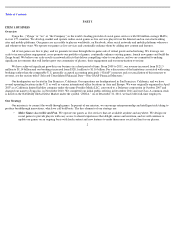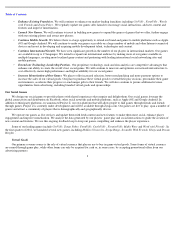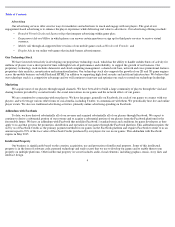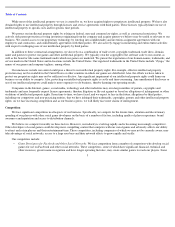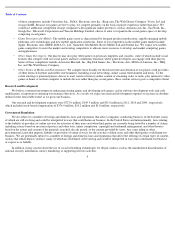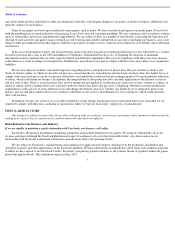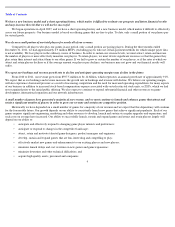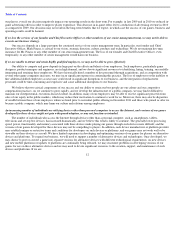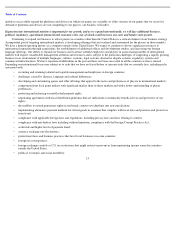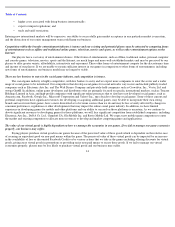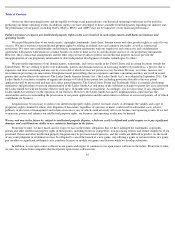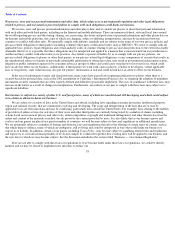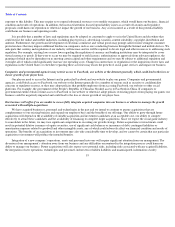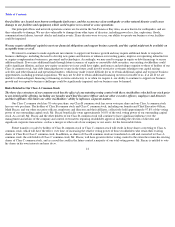Zynga 2011 Annual Report Download - page 16
Download and view the complete annual report
Please find page 16 of the 2011 Zynga annual report below. You can navigate through the pages in the report by either clicking on the pages listed below, or by using the keyword search tool below to find specific information within the annual report.
Table of Contents
our players, even if our decision negatively impacts our operating results in the short term. For example, in late 2009 and in 2010 we reduced in-
game advertising offers in order to improve player experience. This decrease in in-game offers led to a reduction of advertising revenue in 2010
as compared to 2009. Our decisions may not result in the long-
term benefits that we expect, in which case the success of our games, business and
operating results could be harmed.
If we lose the services of our founder and Chief Executive Officer or other members of our senior management team, we may not be able to
execute our business strategy.
Our success depends in a large part upon the continued service of our senior management team. In particular, our founder and Chief
Executive Officer, Mark Pincus, is critical to our vision, strategic direction, culture, products and technology. We do not maintain key-man
insurance for Mr. Pincus or any other member of our senior management team. The loss of our founder and Chief Executive Officer, even
temporarily, or any other member of senior management would harm our business.
If we are unable to attract and retain highly qualified employees, we may not be able to grow effectively.
Our ability to compete and grow depends in large part on the efforts and talents of our employees. Such employees, particularly game
designers, product managers and engineers, are in high demand, and we devote significant resources to identifying, hiring, training, successfully
integrating and retaining these employees. We have historically hired a number of key personnel through acquisitions, and as competition with
several other game companies increases, we may incur significant expenses in continuing this practice. The loss of employees or the inability to
hire additional skilled employees as necessary could result in significant disruptions to our business, and the integration of replacement
personnel could be time-consuming and expensive and cause additional disruptions to our business.
We believe that two critical components of our success and our ability to retain our best people are our culture and our competitive
compensation practices. As we continue to grow rapidly, and we develop the infrastructure of a public company, we may find it difficult to
maintain our entrepreneurial, execution-focused culture. In addition, many of our employees may be able to receive significant proceeds from
sales of our equity in the public markets, which may reduce their motivation to continue to work for us. Moreover, there may also be disparities
of wealth between those of our employees whom we hired prior to our initial public offering in December 2011 and those who joined us after we
became a public company, which may harm our culture and relations among employees.
An increasing number of individuals are utilizing devices other than personal computers to access the Internet, and versions of our games
developed for these devices might not gain widespread adoption, or may not function as intended.
The number of individuals who access the Internet through devices other than a personal computer, such as smartphones, tablets,
televisions and set-top box devices, has increased dramatically, and we believe this trend is likely to continue. The generally lower processing
speed, power, functionality and memory associated with these devices make playing our games through such devices more difficult; and the
versions of our games developed for these devices may not be compelling to players. In addition, each device manufacturer or platform provider
may establish unique or restrictive terms and conditions for developers on such devices or platforms, and our games may not work well or be
viewable on these devices as a result. We have limited experience in developing and optimizing versions of our games for players on alternative
devices and platforms. To expand our business, we will need to support a number of alternative devices and technologies. Once developed, we
may choose to port or convert a game into separate versions for alternative devices with different technological requirements. As new devices
and new mobile platforms or updates to platforms are continually being released, we may encounter problems in developing versions of our
games for use on these alternative devices and we may need to devote significant resources to the creation, support, and maintenance of such
devices and platforms. If we are
12


